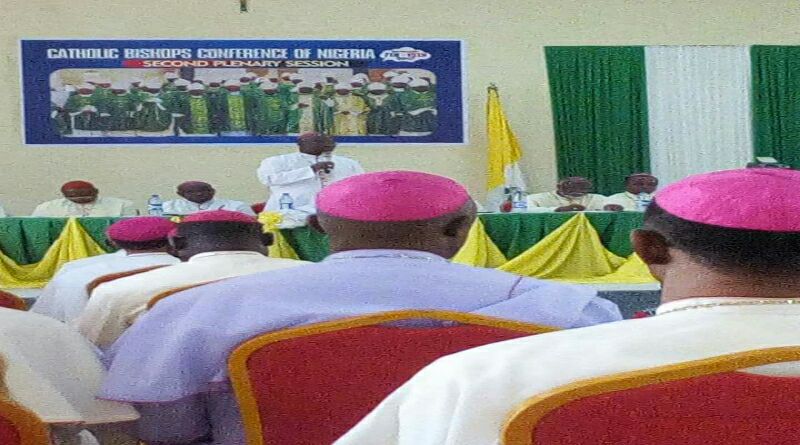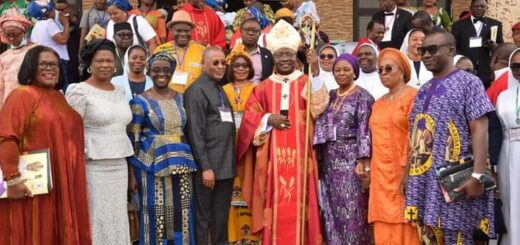THE NIGERIAN ELECTIONS AND BOKO HARAM: THE RESPONSE OF THE CATHOLIC CHURCH
THE NIGERIAN ELECTIONS AND BOKO HARAM: THE RESPONSE OF THE CATHOLIC CHURCH
BY MOST REV. IGNATIUS KAIGAMA, ARCHBISHOP OF JOS AND PRESIDENT CATHOLIC BISHOPS CONFERENCE OF NIGERIA
The last few months leading to the presidential elections in Nigeria have seen political gladiators engaged ferociously in political campaigns. Political promises, barren speeches and campaign of calumny which had little to do with good governance and the issues of poverty, unemployment, bad economy etc. characterized the campaigns. In the face of rising political tension the two most influential presidential candidates, President Goodluck Jonathan and Rtd. Gen. Muhammadu Buhari signed a peace accord twice. The lessons of the accord did not however appear to have reached their teaming supporters and it looked like it was a mere media show. There were attacks in different parts of the country despite all the peace accords.
Weeks and months to the general elections Nigerians people were apprehensive due to security challenges and speculations that violence could erupt. Some even relocated to their hometowns. The political atmosphere was charged up with various intrigues and strategies. We, as a Church have been praying and working towards free, transparent, fair and peaceful elections. We held national prayer events in Abuja and asked Catholics nationwide to intensify prayers in homes and families for the security and peace of the nation. In the weeks preceding the elections, at our Dialogue Reconciliation and Peace Centre in Jos, we organized series of meetings for politicians of different parties and we have been speaking out on the need for them to avoid politics of bitterness and cultivate the spirit of sportsmanship towards the elections so that they do not see it as a do or die affair. The Catholic Bishops Conference of Nigeria has met with the presidential candidates of the two major political parties; Peoples’ Democratic Party (PDP) and the All Progressives Congress (APC). We have urged them to talk to their supporters who are tempted to cause trouble when their candidates do not appear to be winning. Politicians at local and national levels have signed peace agreements and we sincerely hope they honour them. The Church in Nigeria, through the Justice, Peace and Development Commission of various dioceses was very active in preparing the faithful for the elections. The theme for this year’s Lenten Campaign, “Enthroning the Right to Good Governance” was intended for our people to know and value what it means to participate in and be responsible for the care and improvement of our individual and collective life since going to the polls is a right and a civic duty.
During the opening Mass of the first plenary meeting of the CBCN in 2015 on the 22nd February, in acknowledging the presence of President Goodluck Jonathan who graced the occasion, the President of CBCN Archbishop Ignatius Kaigama among other things highlighted the fate of Nigerians who are refugees in Northern Cameroun. At the end of our conference it was agreed that a delegation be sent to see them. The delegation consisted of The Episcopal Chair of Caritas Nigeria and Justice and Peace and Bishop of Umuahia, Bishop Lucius Ugorji; the Bishop of Maiduguri, Bishop of Oliver Doeme; the Bishop of Yola, Bishop Dami Mamza, and the National Director of Caritas Nigeria and Justice and Peace, Fr. Evaristus Bassey. Fr. Christian Anyanwu later formed part of the delegation, as the director of communications. On the advice of the President of the Cameroun Episcopal Conference, Archbishop Samuel Kleda, the trip was scheduled for the 4th of March 2015. On the 5th, they visited the refugee camp in Minawao, Zamayi. The Camp is run by the United Nations High Commission for Refugees and is a standard refugee camp, with makeshift accommodation made with UNHCR tarpaulins. In that camp alone, there are approximately 36,000 refugees, to commiserate with the refugees, identify their problems, assist them and also through the government facilitate their return to their various homes. Some funds donated by President Goodluck Jonathan to the CBCN when he learnt of our proposed visit to the Nigerian refugees in addition to the funds collected by the Bishops are being disbursed by the Justice, Peace and Caritas Nigeria.
The Catholic Archdiocese of Jos through the Justice, Development and Peace Commission (JDPC), is offering microcredit scheme geared towards empowering the women especially who are most hit in the crisis. The church is doing the little in her power, to compliment the efforts of government but more assistance would be needed in dealing with cases of reintegration and rehabilitation.
The internally displaced persons who initially returned to territories recaptured by the Nigerian Military are coming back to the Camps because all means of livelihoods have been destroyed and there’s really nothing to fall back on. Through the Justice Development and Peace Commission (JDPC) the Church effectively registers them and distributes relief materials. The solidarity in the body of Christ is edifying. Our strength lies in God and in our brotherhood. The Catholic Bishops Conference of Nigeria has been mobilizing support across all Dioceses in the Country for the worst hit North Eastern Dioceses.
In early January, I personally was involved along with the Justice, Peace and Development Commission of Jos Archdiocese to distribute items worth 7 million Naira (contributed by Catholics of Jos) to over 2,000 displaced persons in Jos. We, like some other dioceses in the North are hosts to priests who are taking refuge in our dioceses. Some Dioceses from Southern Nigeria have been very kind in donating money to help with the situation of displaced people.
Statistics made available by the JDPC Coordinator of the Catholic Diocese of Yola in Adamawa State, Nigeria, shows that there are 29,500 IDPs in their care. They provide food, aid, free medical services and run a full time clinic and maternity for displaced persons and Yola and its environs.Also, the Church of Assumption, a Parish in the Archdiocese of Abuja, Nigeria has proposed to offer scholarship to 160 displaced students, 80 each of Yola and Maiduguri Dioceses. Because of the growing number of widows and to cater for their needs, the Catholic Diocese of Maiduguri, has formed a Widows Association. According to the Catholic Bishop of Jalingo, Most. Rev. Charles Hammawa, over 2000 IDPs have been absorbed into families and schools in the Diocese of Jalingo,Taraba State, Nigeria. The Diocese through its JDPC and St. Vincent De Paul Society has been catering for their various needs. They have also admitted displaced students, boys and girls into some of their Schools. A total of 1,950 persons from 494 Households were registered in 20 Parishes and Muslim communities within Jos; but when news got to other displaced persons who were not registered the number rose to 560 households to include displaced Reverends, Pastors and their families. Contributions received from Catholic faithful within the Catholic Archdiocese of Jos and from kind hearted individuals in cash and kind which amounted to over Seven Million Naira was distributed to the displaced persons. Over 36,000 Nigerian Refugees are being housed by the United Nations Refugee Agency (UNHCR).
His Holiness, Pope Francis, is very much in solidarity with Nigeria. He wrote to the Catholic Bishops Conference of Nigeria (CBCN) assuring his nearness and made a donation to help the victims of terrorist attacks in Northern Nigeria. The Catholic Church has consistently condemned the activities of the fanatical militant Islamic group Boko Haram asking the Federal Government to bring an end the activities of these killers.
In an unprecedented and impressive turn out, Nigerians defied all odds especially of the Boko Haram sect who reject democracy as un-Islamic and has threatened to kill any Nigerian who casts a ballot. Some say, this so far is the most participated election. The military has increased its presence in order to ensure public safety and in order to cater for the estimated 1.5 million displaced people, special polling stations were set up in refugee camps. We are positive that despite skirmishes is some quarters, the official announcement of the election results will go down well. Whoever emerges as the next President would have to address the nation’s burning issues and improve on the status quo.
Nigeria may have a terrible reputation but offers the rest of the world a lesson: resilience. Despite these odds, we manage to smile through our tears and have remained strong, resilient and hopeful.That is not what most outsiders associate with Nigeria. Smiling faces, positive minds and hopeful hearts.
This optimistic disposition of Nigerians was what led to a successful presidential election even despite the logistic hiccups, with Muhammadu Buhari of the All Peoples Congress defeating the sitting President, Goodluck Jonathan of the Peoples Democratic Party. Those who predicted the disintegration or destabilization of Nigeria will be surprised to know that irrespective of our multidimensional problems, Nigerians still love Nigeria and want to live as one big family. As we await the official announcement of the winner ( this Tuesday night) we are convinced that once there is life there is hope.




